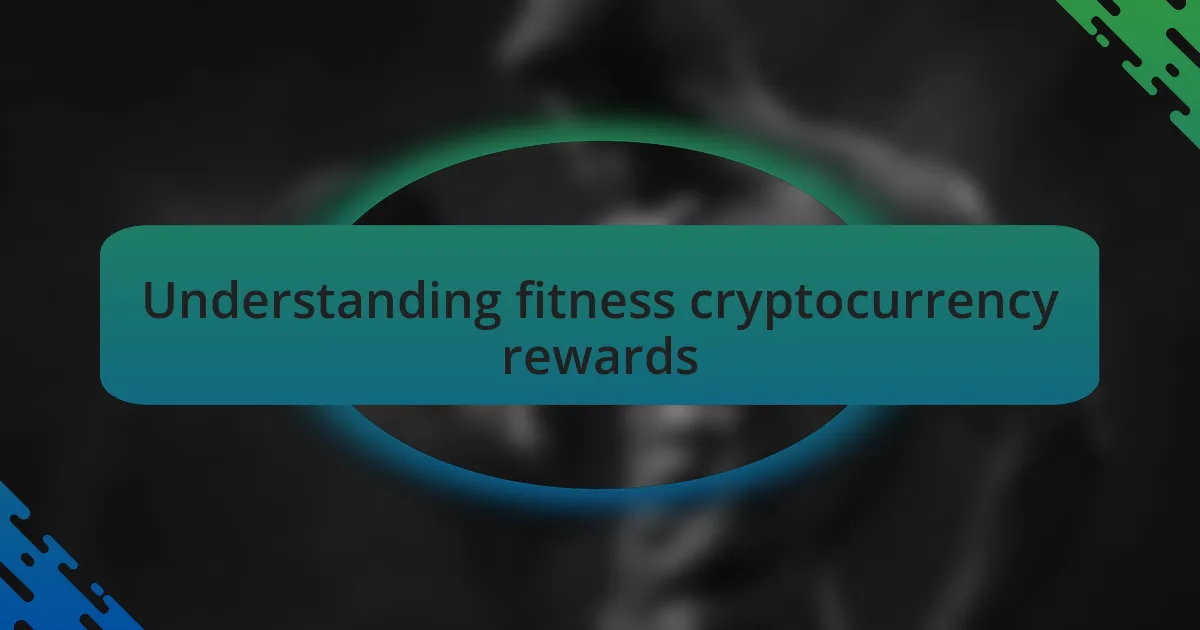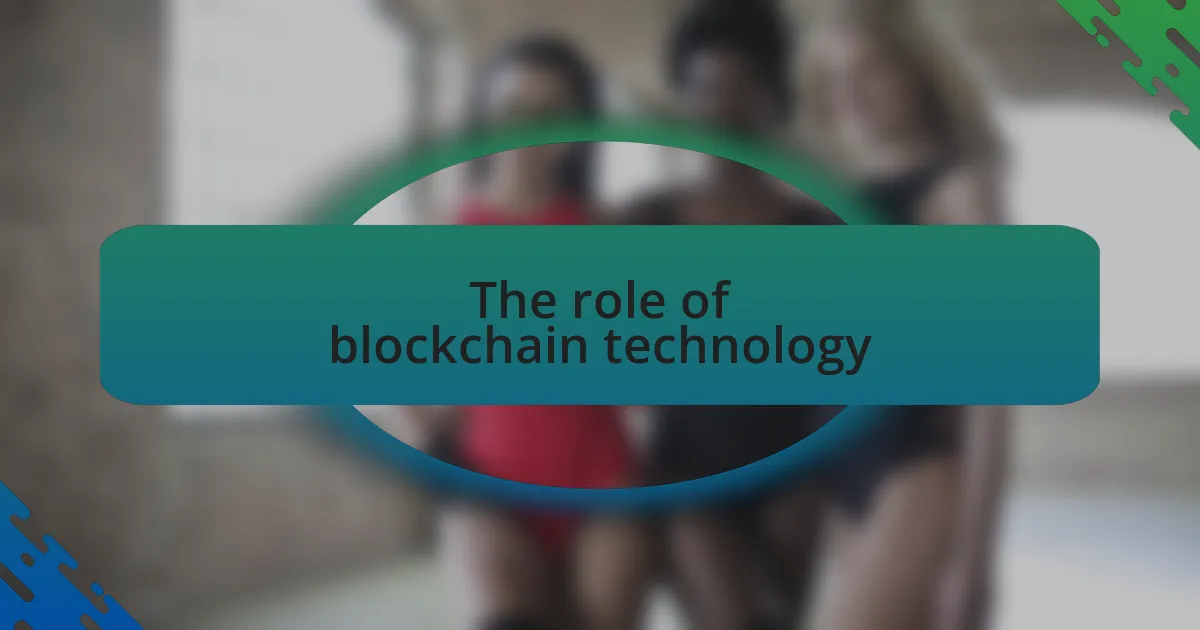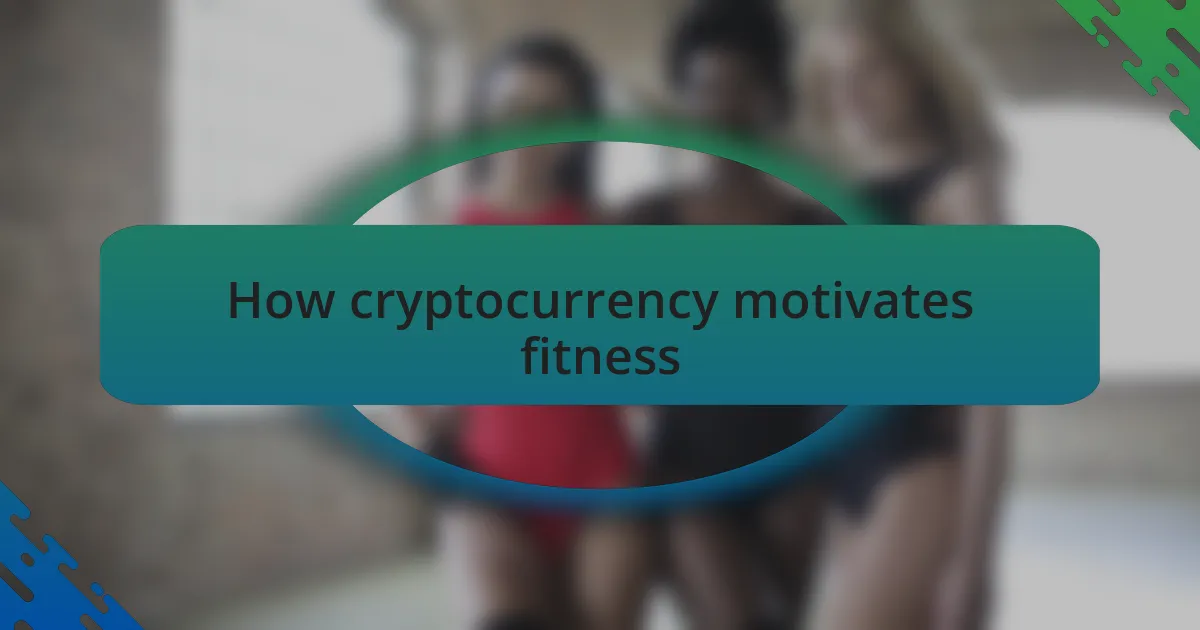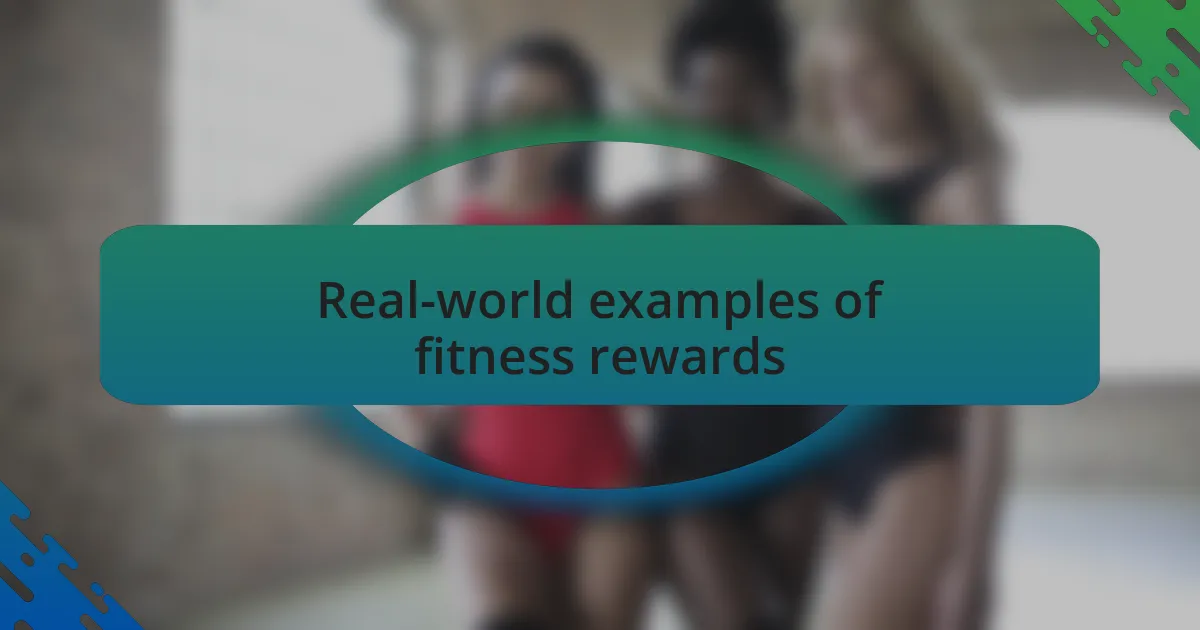Key takeaways:
- Fitness cryptocurrency rewards motivate healthy lifestyles by converting physical activities into digital tokens that can be redeemed or traded.
- Blockchain technology ensures the security, transparency, and accuracy of fitness data, empowering users with control over their personal information.
- Community-driven fitness challenges incentivized by cryptocurrency foster friendly competition and enhance user engagement.
- Real-world apps successfully demonstrate the effectiveness of integrating blockchain and cryptocurrency into fitness regimes, turning everyday activities into rewarding experiences.

Understanding fitness cryptocurrency rewards
Fitness cryptocurrency rewards represent a revolution in how we incentivize a healthier lifestyle. I remember the first time I earned digital tokens for simply tracking my workouts—it felt exhilarating, almost like winning a mini jackpot every time I hit a goal. This blend of fitness and technology not only motivates us to stay active but also creates a sense of community, as we share achievements and challenge each other.
Have you ever wondered how these tokens actually work? They’re usually earned through apps that track your physical activities, turning steps or workouts into cryptocurrency. I was amazed by how easily my morning runs translated into tangible rewards, inspiring me to lace up my shoes more often.
What’s compelling about fitness cryptocurrency is its flexibility. Unlike traditional reward systems, these tokens can often be redeemed for health-related products or even traded for other cryptocurrencies. I recall a time when I used my earned tokens to purchase workout gear, which reinforced my commitment to my fitness journey. It’s this cycle of reward and reinvestment that makes fitness cryptocurrency rewards not just a financial incentive, but a holistic approach to personal wellness.

The role of blockchain technology
Blockchain technology plays a critical role in ensuring transparency and security in fitness cryptocurrency systems. I vividly remember the first time I understood how every transaction was logged on an unchangeable ledger. It gave me peace of mind knowing that my earned tokens were secure, and I could trust that my progress was accurately recorded and recognized.
Moreover, the decentralized nature of blockchain means that users have greater control over their data. I often wondered how my information was being used, and learning that blockchain empowers me to own my fitness data was a game changer. It felt empowering to know that no company could manipulate my stats or unfairly influence my rewards—a real shift toward user-centered technology.
Perhaps the most exciting aspect is blockchain’s potential to create a global community of fitness enthusiasts. When I think about connecting with others across borders through shared rewards systems, it sparks a sense of belonging. Can you imagine earning tokens through workouts while also contributing to a larger, health-oriented global network? This perspective reshapes how we view fitness rewards by fostering collaboration and mutual motivation.

Benefits of blockchain in health
Blockchain technology in health can significantly enhance data security. I recall a time when I was concerned about the privacy of my health records. The thought of sensitive information being exposed was unsettling. With blockchain, the encryption of data ensures that only authorized individuals can access my records. This gives me a sense of security, knowing that my personal health information is well-protected from breaches.
Another remarkable benefit of blockchain in healthcare is its ability to improve the accuracy of medical records. In my experience, miscommunication or errors in data entry can lead to serious consequences. With blockchain’s immutable ledger, every update is permanently recorded, reducing the risk of human error. I can’t help but think how invaluable it would be for doctors to rely on accurate, real-time health data, enabling better treatment decisions.
Lastly, the potential for enhanced patient engagement is a game changer. I’ve personally felt a disconnect between my healthcare providers and myself. But with blockchain, patients can take an active role in managing their health data. Wouldn’t it be great to have a seamless platform where you could not only track your progress but also communicate directly with providers? This level of involvement fosters a deeper relationship between patients and healthcare systems, promoting proactive health management.

How cryptocurrency motivates fitness
Integrating cryptocurrency into fitness rewards creates a unique incentive structure. I remember the first time I completed a health challenge and received tokens as a reward. The thrill was palpable; it wasn’t just about completing the challenge, but also about receiving something tangible that I could later use for fitness gear or services. This direct reward system makes the pursuit of fitness feel not just beneficial but also profitable.
Moreover, the motivational aspect of cryptocurrency comes from its community-driven nature. In my experience, joining fitness groups that offer crypto rewards fostered a supportive environment. Every step or workout shared within the community felt like contributing to a larger mission. It ignited a competitive spirit, pushing me to improve while sharing that journey with others. Have you ever experienced that little rush of excitement from friendly competition? It’s contagious and fuels a motivation to maintain a fitness routine.
Even the prospect of earning cryptocurrency for consistent healthy habits encourages commitment. I found myself pushing through workouts simply to earn those coins. The idea that my effort could result in financial gain was a game changer. It made me wonder, what if every workout was more than just a personal achievement but also a way to invest in my future? That kind of motivation can transform how we view fitness, making each step count toward both physical and financial health.

My personal blockchain journey
Diving into blockchain was truly an eye-opening experience for me. I stumbled upon a blockchain-based fitness app while searching for new ways to enhance my workouts. Initially, I was skeptical but decided to give it a shot. As I started tracking my physical activities and earning tokens, I realized that I was not only getting healthier but also engaging with a technology that could redefine how we think about wellness.
Interestingly, the moment I understood blockchain’s potential to secure and verify my fitness achievements was a breakthrough. I’ll never forget how exhilarating it felt to see my workout data converted into digital assets. It gave me a sense of ownership and accountability. Have you ever felt that rush when you achieve something significant? That feeling amplified when I knew my hard work was being recognized and valued through a decentralized system.
Reflecting on my journey, I can genuinely say that blockchain transformed how I view my health investments. When I earned rewards through consistent effort, it sparked a newfound motivation. I felt empowered knowing that my dedication could lead to tangible benefits. As I engaged with this technology further, I couldn’t help but wonder how many others are out there, waiting to harness this potential for their fitness journeys.

Real-world examples of fitness rewards
Some real-world examples of fitness rewards really highlight the potential of blockchain technology in promoting a healthier lifestyle. For instance, I recently came across a fitness app that rewards users with cryptocurrency simply for completing daily step goals. The thrill of seeing my digital wallet grow as I walked was motivating in a way traditional fitness goals hadn’t been. Who knew my daily walks could turn into a rewarding experience beyond just health benefits?
Another impressive example is how some gyms utilize blockchain to encourage regular attendance. Members earn tokens that can be redeemed for merch or even discounts on memberships based on their check-in frequency. I remember the sense of achievement when I could trade my hard-earned tokens for a new workout outfit. It made me think: what other everyday activities could I transform into rewarding experiences?
Lastly, I’ve seen wellness challenges where participants can earn tokens for engaging in fitness-related activities. Competing with friends added a layer of fun and motivation. It was more than just exercise; it became a social event that led to new friendships. Have you ever participated in a challenge that pushed you to new limits? That’s exactly what happened for me; it reinforced my commitment to a healthier lifestyle while building a community around it.